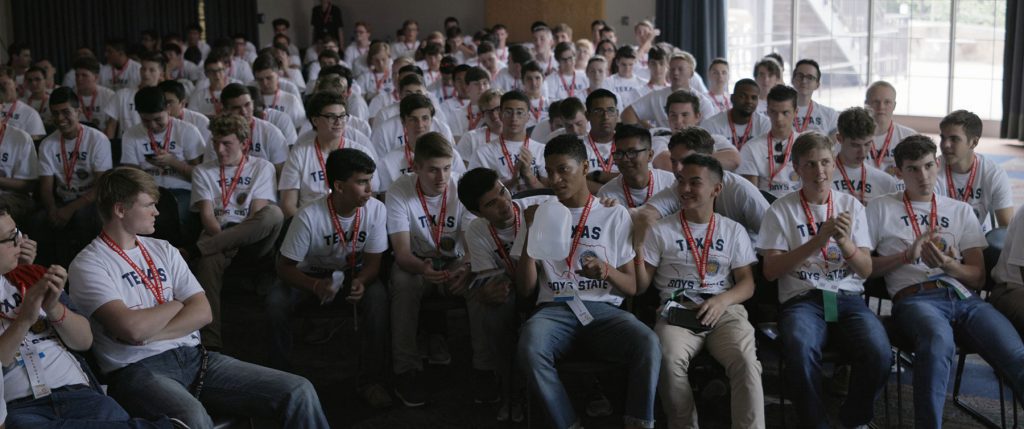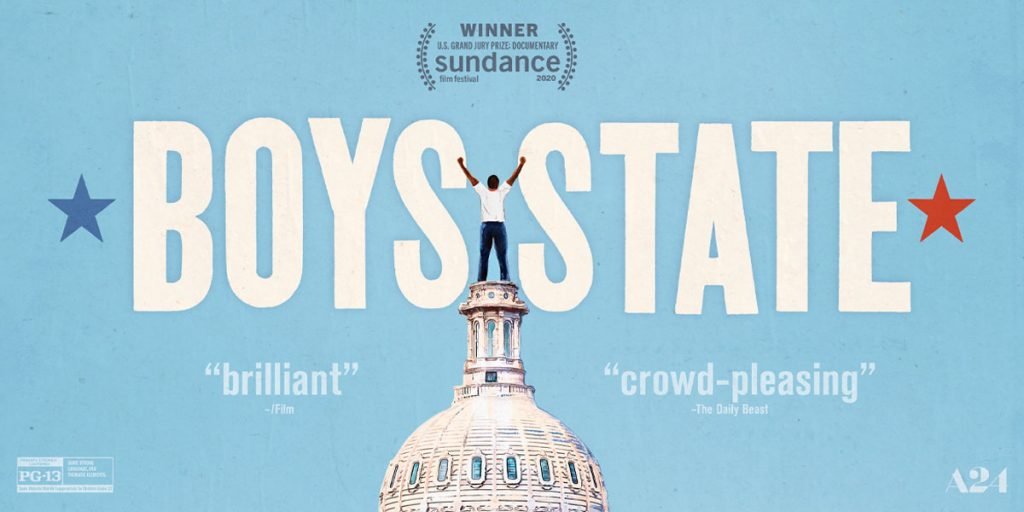Boys State is an expertly made documentary that examines the current state of politics, as told through the young men who represent the future of the country.
Towards the end of my senior year, my best friend and I were called to the guidance counselor’s office and informed that we had been selected for a program called Boys State. This was something neither of us knew anything about, except that two of our friends had gone the year before and had a reasonably good time. A few months later, we were dropped off at the campus where the event was to take place, and proceeded to have a very interesting week of mock politics, public speaking, and questionable meal choices. I suspect the process varies from State to State, but at its core, Boys State is an annual political exercise sponsored by the American Legion that takes place in every state except Hawaii.
At the start of the week, 1,000 high school junior boys (there is also a Girls State) gather together, are separated into two political parties (the Nationalists and the Federalists) and are tasked with creating a mock government from the city up to the State level, with executive, judicial, and legislative branches. It is intense, exhausting, and an experience few who participate will forget. Seasoned documentarian Jesse Moss (The Overnighters, The Family, War Game) and newcomer Amanda McBaine take this 85-year-old process and turn into an exhilarating investigation at the current and future state of the American political system, and one of the best documentaries in recent memory.
Boys State chooses to put its focus on four of young men chosen to represent their schools at the 2018 Texas Boys State, each determined to make as much of an impact as possible. Ben Feinstein (Federalist), a self-described “politics junkie” whose ownership of a Ronald Regan action figure tells you much more than he ever could. René Otero (Nationalist), one of the few black and even fewer liberal citizens, whose exceptional oratory skills instantly sets him apart. Steven Garza (Nationalist), a parent of immigrants and one of the few candidates to embrace honesty and civility. And Robert MacDougall (Nationalist), an outspoken West Point hopeful whose campaign strategy yields interesting results. From the start, each is determined to attain a position of power and visibility: René and Ben each take the position as their party’s state chair in charge of crafting the party platform, while Robert and Steven begin their campaigns for Governor.

From the start, Moss and McBaine realize the inherent spectacle of politics and opt for a more laid-back filmmaking approach. This is heavily influenced by the documentaries of Frederick Wiseman such as High School and Titicut Follies, in which the camera takes on the role as a passive observer and lets the image speak for itself. You don’t need to use fancy cinematography or tricky editing when a simple montage showcasing various teenagers with different degrees of public speaking experience as they attempt to win over a crowd has more entertainment value than most other films could never hope to achieve. Boys State successfully coasts off of the subtle ridiculousness of the concept of boys playing politics and puts its focus on the showmanship elements of running and winning an election; it never asks for your attention but manages to grab it within the first five minutes, and doesn’t let go until the credits start rolling.
Boys State may have an uninvolved approach to its filmmaking, but that doesn’t mean it’s not saying anything important. As soon as the political process starts up, the scene begins to mirror the actual situation in Washington. Despite calls for compromise and clear thinking among the more level headed citizens, party discussions on subjects from gun control to abortion quickly derail into calls for “succession from the union,” something passed by the previous year’s legislature that serves as a symbolic gesture of the impulse of youth. Calls to take the process seriously are met with boos, and replaced with proposed legislation to ban pineapple from pizza and change the correct pronunciation of the letter w to “dubya”. Once Steven secures his spot as the party candidate for governor, René and Ben instantly form a rivalry that becomes progressively nasty, as they each attempt to bring victory to their party, despite René’s constant stance that bipartisanship is the path to success. It becomes abundantly clear that there is little place for morals and ethics here, despite the best efforts of those who would like to keep things civil.
As the film progresses, a few themes and ideas become exceedingly clear. Clear from the start is that the world of politics has almost completely moved into virtual space. Before party platforms have been decided on, Instagram pages are created and group chats formed to help spread the word as quickly as possible. While this is generally used as a positive tool, its ugly head is reared when an Instagram account is formed with the focus on impeaching René after he refused to entertain the notion to “succeed from the union.” Ben pounces and begins aggressively promoting the account and their subpar memes but is blindsided when the account begins making racist remarks, resulting in a sizeable setback that shakes the faith of many Federalists.
Also on display is a very damming examination of which personalities succeed and which don’t, when attempting to gain public opinion. Robert’s strategy for winning the party nomination involves adopting policies he believes his fellow citizens will be receptive to, which ultimately loses him the nomination. On the other hand, René begins his campaign by sticking to his values but changes them to become more palatable once threatened with impeachment. It’s a grim juxtaposition that shows how one’s personal and perceived values have little effect on one’s success, and that presentation is everything.
My week at Boys State was drastically different from the one depicted here. The topics of debate never strayed into the real world, and the overall atmosphere was laid back and without real pressure. I was elected to the city council and crafted local laws most of the time, while the other members of my city generally did nothing. However, I expanded my appreciation for government, as flawed as it is, and I gained valuable knowledge on how to win people to your cause.
Boys State is very conflicted on the future of American politics: Steven’s abrupt and surprising rise to prominence mirrors that of Alexandria Ocasio-Cortez, and gives us hope that those who truly want to help others have a chance of making it. On the other hand, Ben’s alarmingly effective smear campaign reminds us that most are out for personal gain and don’t care what they have to do to win. Whatever you take away from Boys State, it’s impossible to deny that Moss and McBaine have crafted an instant classic that’s on track to become one of the defining documentaries in recent memory.
Boys State is now available to watch on AppleTV+.

